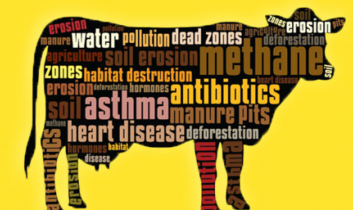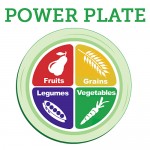 People are obsessed and focused on how vegans get their protein. As a vegan, I am bombarded with questions about protein all the time. It can become tiring to constantly explain people’s misplaced concerns about my daily protein intake. I know people mean well and want what’s best for me, but believe it when I tell you, as a vegan I get plenty of protein. Read on to find out some of the preconceived notions people have about protein and the vegan diet.
People are obsessed and focused on how vegans get their protein. As a vegan, I am bombarded with questions about protein all the time. It can become tiring to constantly explain people’s misplaced concerns about my daily protein intake. I know people mean well and want what’s best for me, but believe it when I tell you, as a vegan I get plenty of protein. Read on to find out some of the preconceived notions people have about protein and the vegan diet.
We live in a society in which we have been misled to believe that meat and dairy products are the only source of dietary protein worthy of any merit. People believe that without animal protein, it’s impossible to be healthy. The message is all around us (news, media, billboards, etc…) because that’s what those large industries want us to believe. Although protein is certainly an essential nutrient which plays many key roles in the way our bodies function, we do not need animal protein in order for us to stay healthy and strong. In fact, beans, legumes, and vegetables which are the staples of a plant based diet contain more protein per calorie than your traditional slab of meat.
 The animal protein push is not only based on lies but it’s killing us too; luring us to feast on factory-farmed, hormone and pesticide loaded, low-fiber foods that are extremely high in saturated fat. Eating this way, is one of the biggest contributing factors to the rise of heart disease (the world’s #1 killer), diabetes, obesity, many forms of cancer, and other common health problems; making the US one of the unhealthiest and sickest societies in the World.
The animal protein push is not only based on lies but it’s killing us too; luring us to feast on factory-farmed, hormone and pesticide loaded, low-fiber foods that are extremely high in saturated fat. Eating this way, is one of the biggest contributing factors to the rise of heart disease (the world’s #1 killer), diabetes, obesity, many forms of cancer, and other common health problems; making the US one of the unhealthiest and sickest societies in the World.
Also, most people usually eat more animal protein than they can process. Excessive animal protein can be incredibly toxic to our bodies, causing a significant amount of dehydration, as well as loss of muscle mass and bone calcium.
While protein is needed to help build and repair muscle tissue; animal protein is not your only option. Eating more whole, plant based foods can provide you with the nutrients, vitamins, and minerals you need to stay healthy and strong. Get rid of the pic ture of a dinner dish in your mind that shows a piece of meat, veggies, and a whole grain because your meal can be so much more.
ture of a dinner dish in your mind that shows a piece of meat, veggies, and a whole grain because your meal can be so much more.
It is recommended that adults, both male and female, consume 0.80 grams of protein per kilogram of body weight per day. There are 2.2 pounds per kg, so a person weighing 150 pounds weighs approximately 68 kg. This means that they need to consume approximately 54.5 grams of protein per day. Below is a list of plant based foods that are also high in protein.
Going vegan opens up a whole new world of tasty foods and flavors. A vegan diet can be full of delicious, high protein foods, plus you can help save a lot of animals from the misery of factory farms while improving your own overall health.
| FOOD | SERVING SIZE | PROTEIN |
| Tempeh | 1 cup | 31 |
| Soybeans, cooked | 1 cup | 29 |
| Seitan | 3 ounces | 21 |
| Lentils, cooked | 1 cup | 18 |
| Black beans, cooked | 1 cup | 15 |
| Kidney beans, cooked | 1 cup | 15 |
| Chickpeas, cooked | 1 cup | 15 |
| Pinto beans, cooked | 1 cup | 15 |
| Lima beans, cooked | 1 cup | 15 |
| Black-eyed peas, cooked | 1 cup | 13 |
| Veggie burger | 1 patty | 13 |
| Veggie baked beans | 1 cup | 12 |
| Tofu, firm | 4 ounces | 11 |
| Tofu, regular | 4 ounces | 10 |
| Quinoa, cooked | 1 cup | 8 |
| Peas, cooked | 1 cup | 8 |
| Textured Vegetable Protein (TVP), cooked | 1/2 cup | 8 |
| Peanut butter | 2 Tbsp | 8 |
| Veggie dog | 1 link | 8 |
| Spaghetti, cooked | 1 cup | 8 |
| Almonds | 1/4 cup | 8 |
| Soy milk, commercial, plain | 1 cup | 7 |
| Whole wheat bread | 2 slices | 7 |
| Almond butter | 2 Tbsp | 7 |
| Soy yogurt, plain | 8 ounces | 6 |
| Bulgur, cooked | 1 cup | 6 |
| Sunflower seeds | 1/4 cup | 6 |
| Cashews | 1/4 cup | 5 |
| Spinach, cooked | 1 cup | 5 |
| Broccoli, cooked | 1 cup | 4 |
References:
Mangels R, Messina V, Messina M., The Dietitian’s Guide to Vegetarian Diets
Rizzo, N., Jaceldo-Siegl, K., Sabate, J., & Fraser, G., Journal of the Academy of Nutrition and Dietetics
Rodriguez NR, DiMarco NM, Langley S., Nutrition and Athletic Performance.

